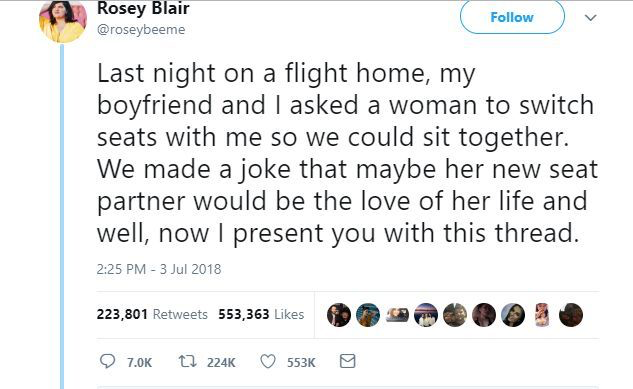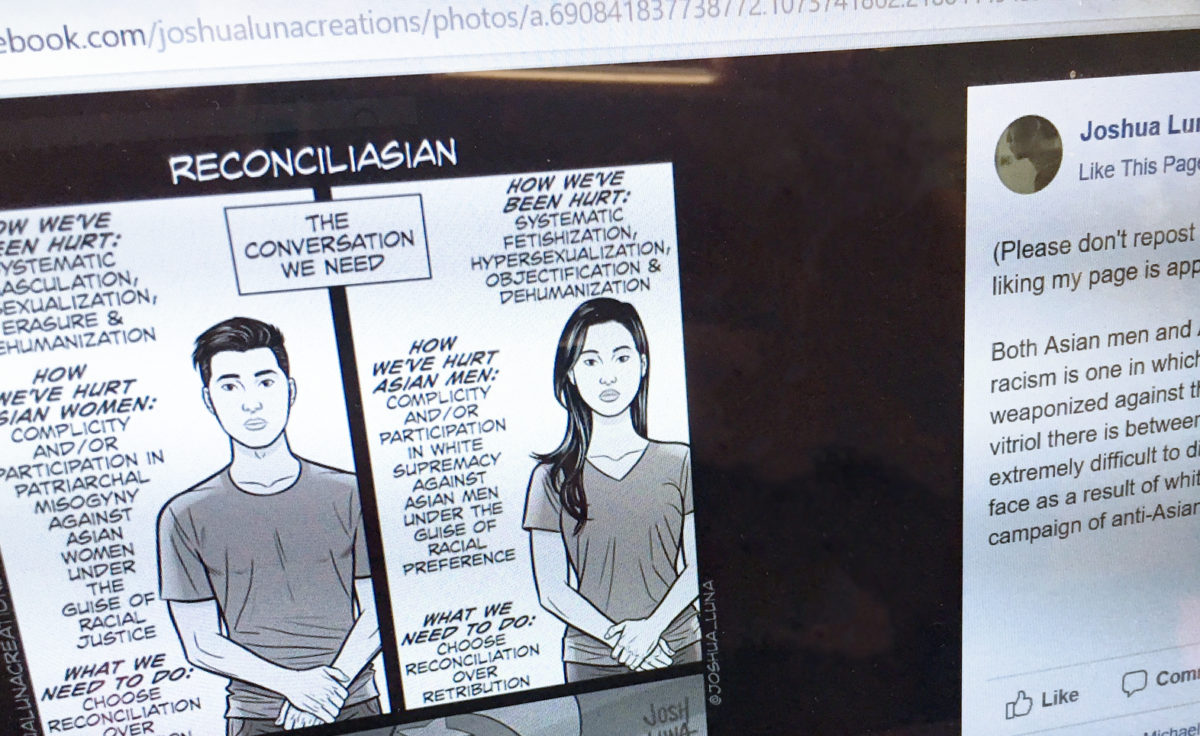By Guest Contributor: Muqing M. Zhang (@muqingmzhang)
On July 3, 2018, Rosey Blair, an aspiring actress and blogger, posted a nearly sixty tweet long Twitter thread, detailing every private interaction that a woman sitting in front of her on a plane had with the man sitting next to her, over the course of a roughly four-hour flight. (Editor’s Note: Reappropriate has chosen not to link the original Twitter thread in this post.)
Blair posted photos of the woman and a baby picture of herself that the woman had on her phone. Blair also heavily insinuated that the woman had sex with the man in the bathroom and shared personal information from the woman’s Instagram—all without the woman’s knowledge or consent. After its posting, the Twitter thread went astronomically viral, reaching nearly one million likes and 300,000 retweets as of today’s writing. It was covered in every major American news outlet including CNN, USA Today, and the Washington Post; the latter gushingly described the incident as the “love story of the summer.”
While many have received Blair’s thread as a simple feel-good love story—a love-at-first sight saga—it has been met with some pushback. Several writers have examined the story as an example of the prevalence of the dystopian gaze of social media over our everyday private lives, attributing a creepy voyeurism or even a malicious breach of privacy to Blair. Yet few have critically examined the saga through the lens of racialized and gendered power dynamics in online space.
Most have approached the story presuming that the woman, who subsequently became known as #PrettyPlaneGirl, is white. In fact, numerous Twitter users who mined Blair’s thread to identify the woman discovered that the woman is Asian American, while the man she was talking to, whose name is Euan Holden and became known as #PlaneBae, is white — as is Blair. In the ensuing media storm, the Asian American woman has in essence gone into online hiding reportedly due to vicious online sexual harassment, while Holden has egged on the storm with fake posts insinuating at a romantic relationship with the woman and Blair has eagerly lapped up the media attention as an opportunity to ignite her career. In numerous now-deleted tweets, Blair pitched film projects, requested to be hired as a screenwriter, Tweeted at Buzzfeed asking for a job offer, and otherwise fished for writing jobs.
As the aftermath of the viral storm settles, two things have become clear. First, #PrettyPlaneGirl is a story about two white people aggressively capitalizing off of their active hypersexualization of a woman of color and an Asian American woman. Second, this story is a demonstration of how the internet is inherently violent towards women of color, while white people get to violate consent and reap enormous followings with impunity as a reward.
After the story went viral, the woman’s legal name, Instagram, and Twitter account were blasted across the internet against her consent despite declining every single interview request and despite her explicit statements to Blair, Holden, and every major media outlet including the Washington Post, that she wished to remain anonymous. She reportedly received a large number of sex shaming and sexually harassing online comments until she deleted her Instagram and Twitter.
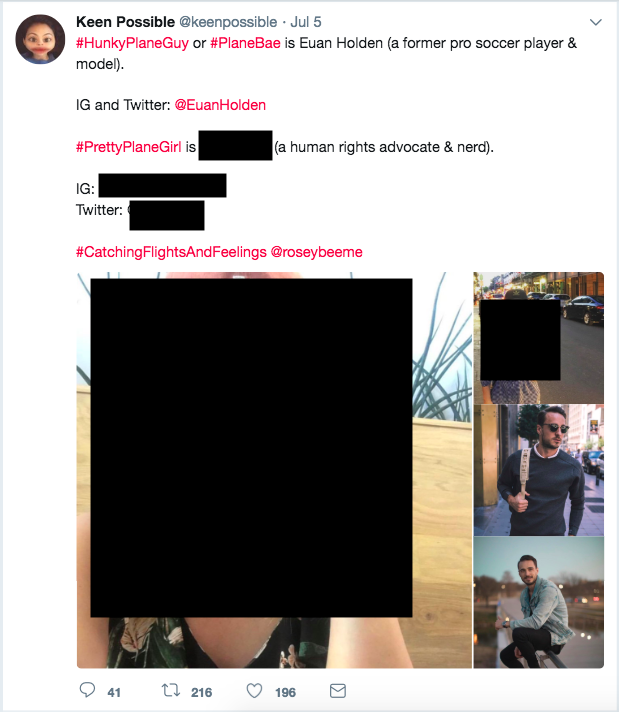
In contrast, Blair, who seems overjoyed at the attention, has basked the media exposure. Not only has she attempted to capitalize on her newfound internet fame, she has also made light of the violation of consent she committed. Blair glibly wrote in an Instagram caption, “My name is Rosey. Kinda funny now that it rhymes with Nosey.” Blair also posted a now-deleted video to Twitter that concerned many due to her flippant admission in the video that the woman refused Blair’s request to discuss her and reveal her identity. Blair, who unlike in the videos in her initial Twitter thread disturbingly spoke in what sounded to be African American Vernacular English, explicitly stated in the video that after directly asking the woman for permission to discuss her and share her identity publicly, that the woman refused to give her “permish” to Blair. This is clear evidence that the woman does not want to be discussed publicly. And yet, Blair concluded the video with a veiled suggestion that the internet reveal the woman’s identity anyways.
In addition, Blair and Holden have repeatedly dragged out the woman’s experience to sexualize her in their media plugs. They have posted numerous Instagram and Twitter posts talking about the woman and implying that she had sex with Holden. In doing so, they are actively trying to spin their violation of her consent into a “magical” “true love story.” In actuality, this is a story of two white people reaping the privileges of Internet virality while “#PrettyPlaneGirl,” as an Asian American woman, bears the racialized and gendered harassment and slutshaming that far too many women of color online experience.
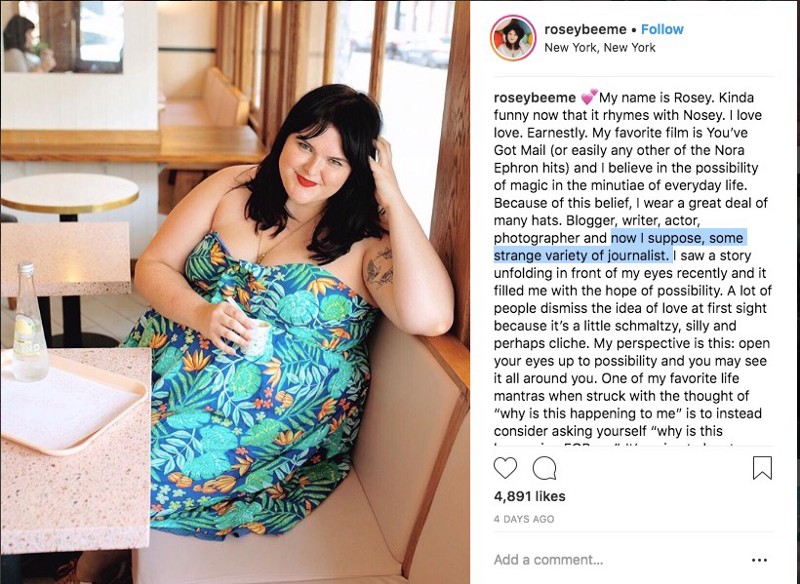
In Blair’s original Twitter thread, the tweet implying that the woman had sex with Holden is the second most liked and retweeted tweet comment in her thread, despite it being common for people in the same row on an airplane to go to the bathroom at the same time. Even when eventually confronted with this possibility by Blair, Holden doubled-down on the sexualization of the woman by commenting, “A gentleman would never tell.”
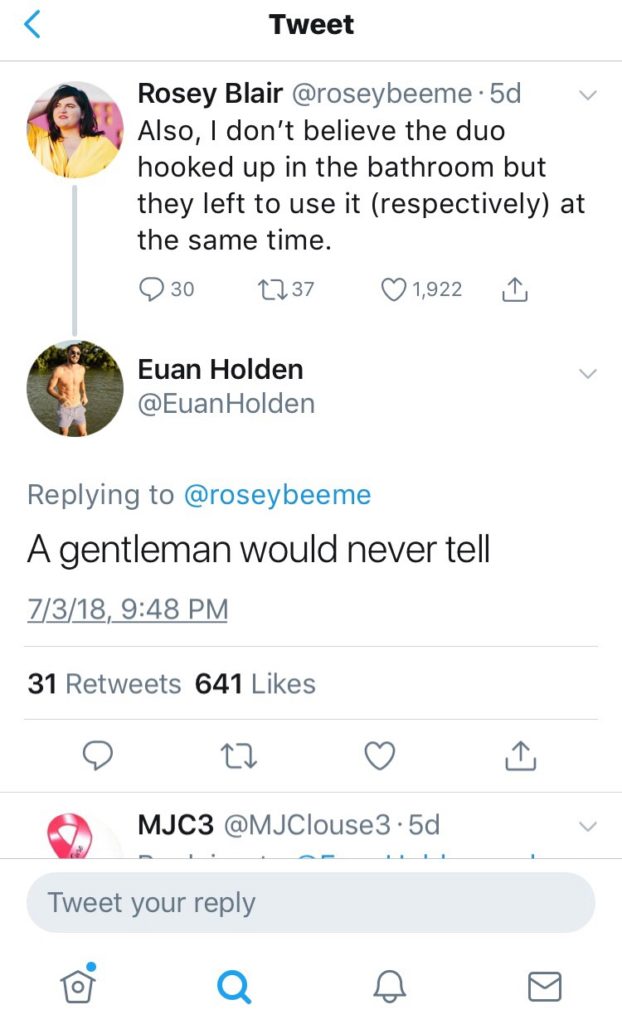
In addition to Blair, Holden has tried to feed the media frenzy by constructing a (clearly false) narrative of a “love romance” between himself and the woman. Holden posted numerous Instagrams with captions such as, “Can’t beat that feeling when you get to see her again.” In another, he insinuated that he was “waking up to texts” from the woman. After multiple Twitter posters pointed out the likely fake nature of his implications of a romance with the woman, Holden changed his captions to more generic ones.
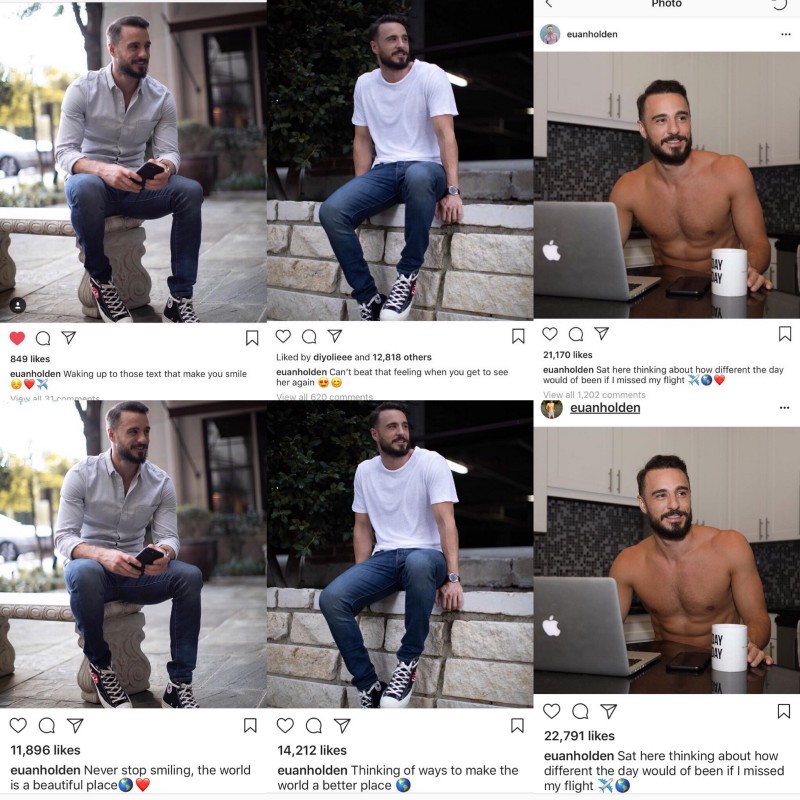
Holden and Blair have respectively gone on to speak and be quoted in numerous print and TV outlets including Good Morning America, the Today Show, and the Washington Post. The latter published an oblivious piece describing the “real stars” of the story as the “voyeurs”—Blair and her boyfriend. On the Today Show on July 5, 2018, as Holden posed for a “candid” pan of him sitting on a couch looking at his phone and, in response to being asked to sum up the woman in a few words, Holden stated “attractive, beautiful” and flashed a wide smile. He hinted that “they’ve spoken” and plan to “meet up.” He also stated that “only time will tell” in response to whether this will end in a “fairytale wedding.” Concluding the heavy-handed interview, Holden stated with dubious veracity that the woman “had a lot to say,” which was immediately followed by a disclaimer statement by the interviewer that the woman had in fact explicitly declined to say anything and wished to remain anonymous.
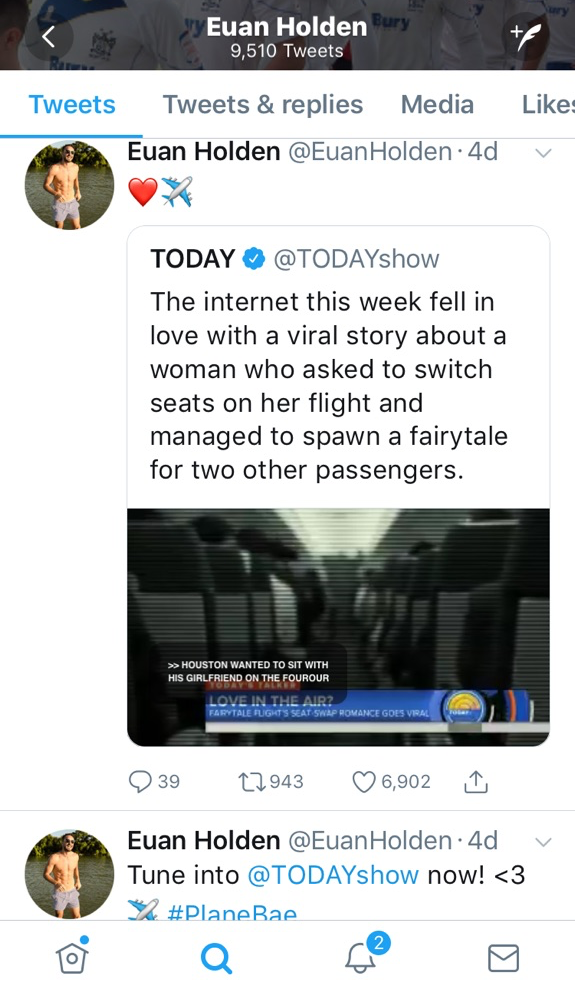
Because of her Twitter thread on the woman, Blair has gone from less than 1,000 Twitter followers to over 65,000, and on Instagram she has reached 37,500 followers. Meanwhile, Holden has gone from 6,600 Twitter followers to 56,000, and on Instagram he has reached 109,000 followers. In addition, Blair has tried to use this story in multiple now-deleted tweets to try to get a job as a journalist at Buzzfeed, to promote her aspiring acting career, and to spin herself as a “journalist” and blogger.
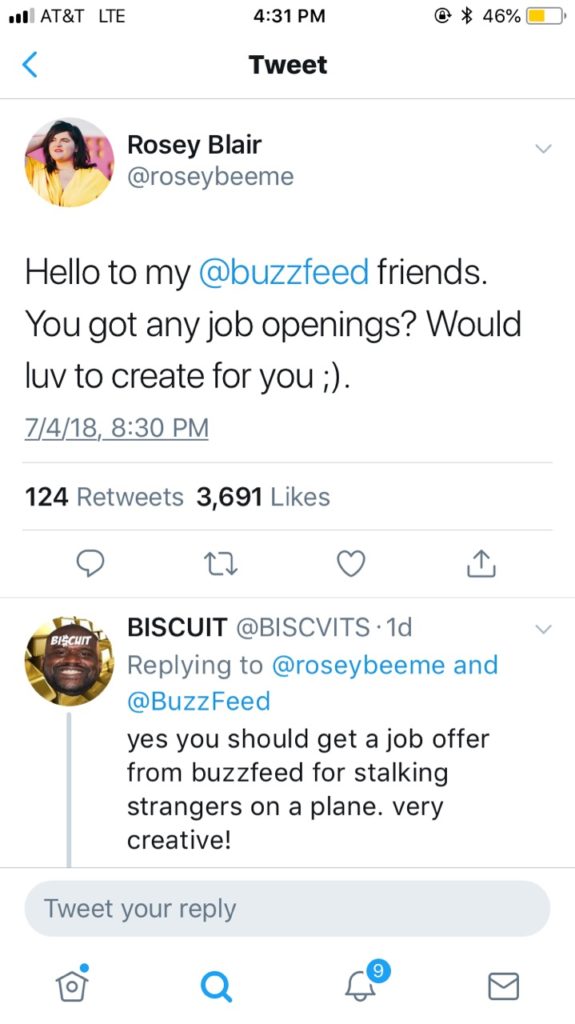
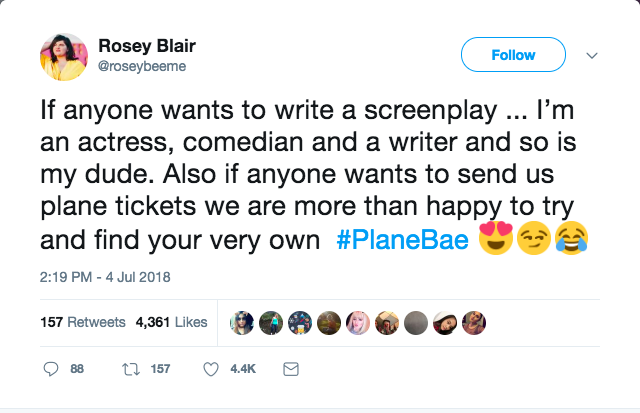
Today, Blair deleted many of her flippant tweets that instigated backlash against her and released on Twitter a public letter directed to the woman as an “apology”—despite knowing that the woman had to delete her Twitter account and was no longer on Twitter. In the apology, Blair, who writes the note addressed to the woman, obnoxiously refers to the woman’s absence online as being due to her being “not much of an internet fan” despite knowing that the woman had had Twitter and Instagram accounts and that the online harassment that Blair instigated forced the woman to delete her social media accounts. In addition, the hyper-public nature of posting of what is supposedly meant to be a personal letter on a platform in which Blair knows that the woman has been harassed off of seems to indicate that the apology is less about actually apologizing and more about damage control. Blair in fact stated both in her now-deleted video in which she discussed how she didn’t get the woman’s “permish” and in interviews that she was communicating with the woman. Thus, if Blair knows how to privately communicate with the woman, why post a performative public apology on the internet, which the woman has been forced to withdraw from because of Blair? In the last line of her public letter to the woman, Blair even manages to throw in yet another subtle promotion of her writing career stating, “I will work to right (or write) this wrong.”
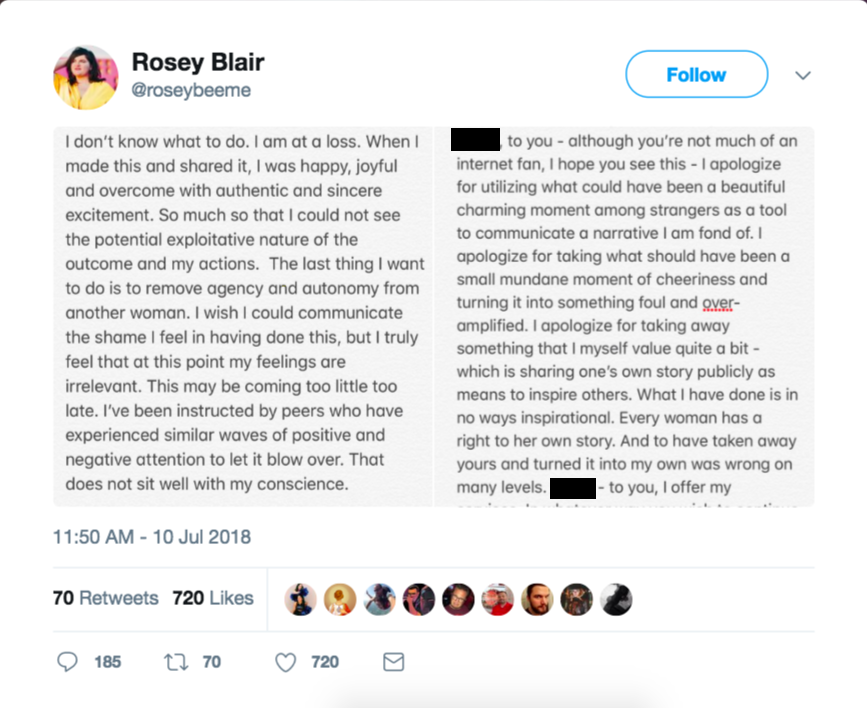
Blair and Holden have profited off of their hypersexualization of the woman in the story. It is undeniable that the racial fetishization of women of color and Asian American women has likely played a role in why the woman was doxxed and harassed while the two white players, Holden and Blair, have become elevated to internet stars. While Black, Native, Latinx, and Asian women are racially fetishized in different ways, what we all clearly share is that whiteness hypersexualizes and fetishizes us. In addition, the fetishization of Asian women has also been well-documented through both research and pervasive narratives. This racial fetishization manifests with tangible consequences: Black, Native, Latinx, and Asian women are sexually assaulted at far higher rates than white women.
The white gaze dehumanizes us all— and in this case, the white gaze was Blair and the audience Blair fed the woman’s story to. Through the lens of the white gaze, women of color are reduced to inhuman things, to be dissected, consumed, and “experienced” as objects of sexual desire. Our humanity is ripped from us when whiteness hypersexualizes our very existence. Every innocuous action we make — like chit-chatting with the person seated next to us on a plane—is repurposed as a sexual act for white gratification. The woman at the center of this story was reduced to a catchy infantilizing hashtag, and she was turned into a sex object by Blair and Holden to be voraciously consumed by millions of people behind a computer screen. Meanwhile, the white people who did this to her — Blair and Holden — have been elevated to the status of internet celebrity.
In addition, while Holden and Blair have shamelessly spinned their now large social media followings into paid media gigs, career advancements, and the social gratification that often comes from amassing large followings, the woman upon whose back they built this fame has received nothing. In contrast, the woman has remained voiceless — harassed into silence. The stark contrast between what has happened to the Asian American woman versus Holden and Blair demonstrates the greater issue of a double standard on the internet. As white people, Blair and Holden have the privilege of experiencing the internet as a playground, where they can prance about shamelessly promoting themselves, while overtly violating other people’s consent rights. Meanwhile, to women of color like the woman at the center of this story and to all women of color who’ve ever gotten a sexist, racist online comment, the internet is a place where we are violated and exploited, again and again.
The intense violence that women of color get bombarded with daily on the internet has been clearly documented and is an everyday occurrence for most women of color active on any social media platform, including myself. In a report by Amnesty International, almost 25% of women have experienced abuse or harassment online. Of the women who had experienced online harassment, 41% felt their physical safety was threatened; 55% experienced panic attacks, anxiety, or stress; and 56% resulted in them being unable to concentrate for long periods of time. In addition, the experience of women of color online is particularly more severe than of white women. In October 2017, the hashtag #WOCAffirmation became trending in response to the disproportionate support that white women like Rose McGowan receive for online harassment while women of color online receive significantly less support for the more severe harassment they endure.
Thus, this story evinces a greater truth— that the internet hates women of color just as it elevates and celebrates exploitative white people. The harassment and doxxing that led to the woman’s withdrawal from the public sphere is connected to the larger issues of entitlement to online space. Women of color are relentlessly harassed and chased off of the internet, because we are viewed as not entitled to take up space with our unapologetic existence—both online and off. Our sexuality is surveilled, posted, and exploited by white people for profit, while we are shamed. In this instance, even if sex did occur, which it clearly did not, the greater question is—why can’t a woman of color go about her life engaging in a sex life without a white woman publicizing iher every step on the internet against her consent and exploiting her sexuality for money? #PrettyPlaneGirl raises greater questions of autonomy and our right as women of color to take up space and benefit off of our own experiences. In this story, the woman of color was reduced to an infantilizing hashtag and harassed off of the internet, while Holden brands himself a dashing “gentleman” and promotes his modeling career and Blair desperately posts to her now 65k Twitter followers about her newfound “journalistic” aspirations. These two white people reaped collectively nearly a quarter of a million of followers across their social media off of intentionally violating the consent of a woman of color and repeatedly hypersexualizing her to the world.
And the most twisted part about this whole story? The public eagerly enabled them to do all of this.
Update (July 13, 2018): Two days after the publishing of this article, the woman released a statement, stating that she has been “doxxed, shamed, insulted and harassed” and that “#PlaneBae is not a romance – it is a digital-age cautionary tale about privacy, identity, ethics and consent.”
The statement was published by Business Insider, linked here.
Below is her full statement:
“I am a young professional woman. On July 2, I took a commercial flight from New York to Dallas. Without my knowledge or consent, other passengers photographed me and recorded my conversation with a seatmate. They posted images and recordings to social media, and speculated unfairly about my private conduct.
Since then, my personal information has been widely distributed online. Strangers publicly discussed my private life based on patently false information. I have been doxxed, shamed, insulted and harassed. Voyeurs have come looking for me online and in the real world.
I did not ask for and do not seek attention. #PlaneBae is not a romance – it is a digital-age cautionary tale about privacy, identity, ethics and consent.
Please continue to respect my privacy, and my desire to remain anonymous.
Muqing M. Zhang is a writer and is currently a law student. She writes on critical race thought, radical Asian American politics, women of color, and diaspora. She can be found on Twitter at @muqingmzhang.
Learn more about Reappropriate’s guest contributor program and submit your own writing here.
